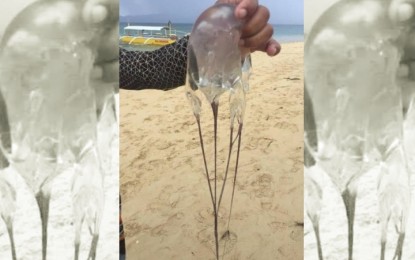
JELLYFISH ATTACK. A man shows a dead jellyfish on Bantayan Island in Cebu province in this undated photo. Bureau of Fisheries and Aquatic Resources - Central Visayas Regional Director Allan Poquita on Tuesday (June 27, 2023) advised beachgoers to wear rash guard to prevent from being stung by jellyfish which could be deadly as it can trigger allergies or high blood pressure. (Photo courtesy of Ben Cabrido Jr.)
CEBU CITY – The top fishery official in Central Visayas on Tuesday advised beachgoers to wear rash guards while swimming at the Cebu northern island of Bantayan to prevent them from being stung by jellyfish.
Dr. Allan Poquita, regional director of the Bureau of Fisheries and Aquatic Resources - Central Visayas (BFAR-7), said jellyfish stings can trigger allergies or high blood pressure which could be the cause of the death of a 31-year-old tourist who got stung while swimming on a beach in the town of Sta. Fe on Bantayan Island.
The fatality identified as Leslie Mardonero, a native of Bohol province, was in Sta. Fe for vacation with friends when she noticed while swimming on a public beach in Barangay Pooc at around 2 p.m. on Sunday that her breast area turned reddish. Three to five seconds later, she collapsed.
Mardonero’s body bore several box jellyfish tentacles when the town responders, headed by Gaudencio Aroganza, checked on her.
Even a doctor and a nurse who happened to be vacationing in the area also tried to revive Mardonero but to no avail.
“If you’re stung by a jellyfish, your body will react and may trigger your blood pressure to shoot up. The sting of all kinds of jellyfish can trigger [a body reaction]. It’s not the jellyfish itself that can kill you but it’s the sting that can trigger your blood pressure to shoot up,” Poquita said.
Sta. Fe Councilor Jaypee Lao, who also works as the town’s tourism focal person, said the municipal government has posted several advisories warning them about the presence of jellyfish in the sea.
“Aside from the posters on the public and private beaches, we also posted the advisory on social media. Hotel and resort owners have also been tapped and we informed them of the possible harm of jellyfish to their guests,” Lao said in a radio interview.
In the Bantayan Island area, Lao said that jellyfish season usually starts every after Holy Week and will multiply in number in around May to July but will “totally disappear” from the sea during August. (PNA)
